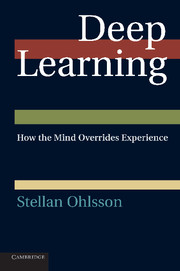7 - Error Correction: The Specialization Theory
Published online by Cambridge University Press: 25 January 2011
Summary
For a slip to be started, yet caught, means that there must exist some monitoring mechanism of behavior – a mechanism that is separate from that responsible for the selection and execution of the act.
Donald A. NormanThe crucial issue in the regulation of intentional action is the opportunity to compare what was intended with what in fact resulted, using the difference between the two as a basis of correction.
Jerome S. BrunerThe world is not a stable, repetitive clockwork that travels forever in the same orbit, but a nonlinear, turbulent and complex system, continuously transformed by forces both material and social. The laws of change are themselves changeable. A person knows this complex world only through a small and necessarily unrepresentative sample of situations. Consequently, prior knowledge will fit some aspects of the person's environment but not others. Even if the world were to stay still, we do not. Every time we colonize a new task environment, we turn into novices once again. The novice struggling to master an unfamiliar task and the competent performer working in a task environment that is changing under his feet differ in some respects, but both scenarios undermine the projectability of prior experience. Attempting to perform the task at hand by methods and strategies that worked well until yesterday, we unavoidably act inappropriately, incorrectly or unproductively part of the time.
- Type
- Chapter
- Information
- Deep LearningHow the Mind Overrides Experience, pp. 205 - 254Publisher: Cambridge University PressPrint publication year: 2011



